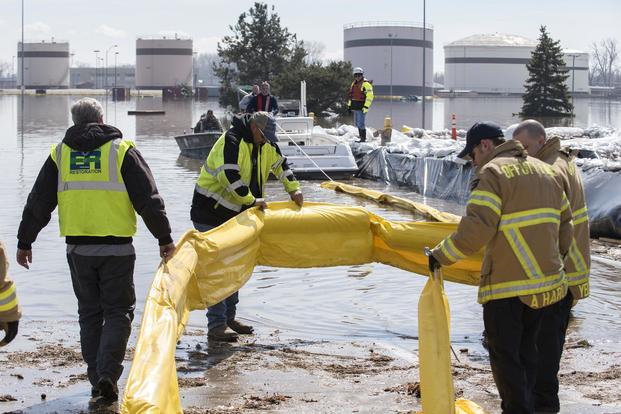A military of "climate literate" troops and bases powered by microgrids, that's the future envisioned by the Pentagon.
Its new climate change plan, ordered by President Joe Biden and released Thursday, would affect every level of command. It seeks to counter the damaging effects of a warming world by educating troops on the potential peril and hardening installations.
Rising sea levels, extreme heat, more severe hurricanes and wildfires are all hitting the military, either by threatening bases and hampering training or by fueling global instability.
"It's real, and no one in the department denies it, particularly the new people, the younger folks," Richard Kidd, deputy assistant secretary of defense for environment and energy resilience, said during a press conference Friday. "This is part of their life, and they're driving it. They're a force for change."
The Pentagon has factored the weather changes into strategic planning for years. But the new public fervor is part of the administration's wider push on climate change, and the DoD's plan was submitted this week, along with proposals from 22 other federal agencies following an executive order.
The new DoD Climate Adaptation Plan will broaden its efforts.
"We intend to adapt the entire department -- our decision-making processes, our training, our equipment, our supply chain, and our partnerships with others," Kidd said at the event hosted by George Washington University's Project for Media and National Security.
Read Next: Pilot Errors Caused Fatal T-38 Training Crash, Air Force Probe Finds
Troops will be educated to improve their "climate literacy," according to the report. The topic should be taught to all during professional development training and at advanced courses, it said.
"In order to properly respond, we need to have the knowledge, the tools and the ability to make climate-informed decisions at all echelons," Kidd said.
Climate change has been a political lightning rod in Washington, D.C., for decades. The Trump administration and other Republican administrations have largely ignored or downplayed the problem, arguing that increases seen in global temperatures are the result of a naturally occurring cycle.
But Biden, a Democrat, has made it a top priority for his administration. The Pentagon has experienced the likely consequences of climate change firsthand in recent years.
Offutt Air Force Base in Nebraska was hit by unprecedented flooding in 2019, and Tyndall Air Force Base in Florida suffered $3 billion in hurricane damage in 2018. California military bases face an increasing threat from wildfires.
The DoD's plan aims to defend installations against such devastation, partly by making them energy self-sufficient.
"We will be building and fielding microgrids with onsite power management, energy generation onsite and power storage," Kidd said. "Our intent over time is to reduce the fossil fuel component, and get to the point that we can operate independently off the grid for 14 days."
He said there also may come a time to "ask some hard questions" and consider whether some military installations are no longer viable for training or operations.
The Defense Department consumes roughly 80% of the federal government's energy, according to the U.S. Energy Information Administration, and is a significant global contributor to greenhouse gas emissions.
But the report does not include specifics on reductions. Those targets will be set by a forthcoming White House executive order, Kidd said. A separate plan and report will follow that will spell out the department's proposals for slashing its own emissions.
"The science is very clear: We have to reduce our greenhouse gas emissions to zero, and we have to do it before 2050 if we want to avoid the most pronounced effects of climate change," he said.
-- Patricia Kime can be reached at Patricia.Kime@military.com. Follow her on Twitter @patriciakime.
Related: Climate Change Could Make 'Military Equipment Useless,' Experts Warn













